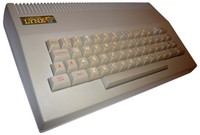Camputers Lynx 48
| Home > Browse Our Collection > Computers > Camputers Ltd > Camputers Lynx 48 |
|
The Lynx 48K was released in March 1983 as a home computer system to directly rival the Spectrum. The specification was rapidly upgraded to 96K in September 1983. Those who had bought a 48K system could send their machines back to Camputers to have the upgrade installed. This was one of the touted features of the Lynx range - easy expandability. At the same time as the 96K Lynxes made it into the shops, the first Disk Drives were released. These were as stylish as the computer, finished in a business style dark grey. They contained their own internal power supplies and had a then-substantial 200 kilobytes of storage capacity. The disk drives were a significant development and offered the Lynx range a disk operating system which worked with, and expanded on, the Lynx's BASIC language. In December, 1983, the Lynx 128K system was released. This sported a completely new motherboard, updated BASIC, a high resolution 80 column screen, and the CP/M 2.2 operating system using the standard disk drives. Whilst the 48K and 96K Lynxes used a Z80A microprocessor clocked at 4 MHz, the 128K used a 6 MHz Z80B microprocessor, giving a substantial speed improvement. Whilst the range of computers and peripherals developed was very good, particularly the stylised modular design, Camputers were in big trouble. Within 18 months of starting, the company went bust in June 1984, owing over half a million pounds. The company's assets were taken over by another company, Anston Technology, but this too quickly folded without making any progress. The reasons for Camputers' failure were manifold. The computers were, at £225, inherently over-priced going into a fiercely competitive and saturated market and particularly as it was clearly pitched to try and capture market share from the Sinclair Spectrum weighing in at only £99. So despite it being much classier than a Spectrum, very few machines were sold in the UK. Camputers were able to sell many more machines in Europe, particularly France, Spain and Greece. The timing of the release of each Lynx model were so late as to have missed their own target markets - the 48K was a year late and should have made the shops in early 1982. The 128K machine should have been widely available by September 1983 but didn't actually come to light until January 1984, completely missing the Christmas 1983 market. There was far too little software written for the Lynx range. Camputers, like so many rivals, under-invested in games and quality applications for the system. Without any so-called 'killer' applications there was little incentive to buy a Lynx in preference to any rival. The final failing of Camputers, which was of their own making, was the lie of the boast of expandability. There was also an implication of compatibility. The 48K Lynx could be expanded to 96K, this was true, but only by returning the unit to the manufacturers, and even then it took them a 'long' time to do the upgrade, even though it was relatively simple. There was no route to expansion to 192K however, not for the 48K or the 96K, despite what it said on the box. Some software which worked on a 48K Lynx didn't work when you got your Lynx back with the new 96K upgrade. Even worse was to follow when the 128K Lynx couldn't handle any 48K or 96K software without significant rewrites. This was due to the different internal architecture of the 128K from the 48K/96K and the BASIC operating system being rewritten in the 128K. The 48K Lynx could not run the disk drives, not without being expanded to a 96K system first. And the 96K Lynx promised to deliver CP/M 2.2 with the disk drives but Camputers gave up and buried this idea. Approximately 30,000 Lynx units were sold world-wide. It is estimated that 20-30% were sold in the UK, the rest in Europe, mainly in France, Spain and Greece. Our model is 48K and has a serial no: 6811
Machine Only
Manufacturer: Camputers Comment on This Page Other Systems Related To Camputers Lynx 48:
This exhibit has a reference ID of CH48996. Please quote this reference ID in any communication with the Centre for Computing History. |
Click on the Image(s) For Detail
|











